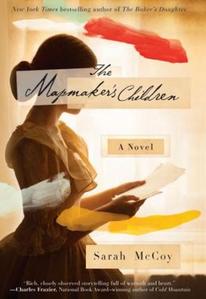

McCoy (The Baker's Daughter) juxtaposes Sarah Brown's story with that of Eden, a woman living in modern-day New Charlestown, W.Va.--mere miles from Harpers Ferry. Lonely and isolated, struggling with infertility and the chasm it has opened in her marriage, Eden stumbles upon a porcelain doll head in a hidden root cellar. With the help of an inquisitive neighborhood girl, she begins investigating the doll's history, which leads them to the Underground Railroad and a surprising connection to Sarah Brown.
McCoy's narrative shifts between Eden and Sarah, telling the women's stories in alternating chapters. Grieving her father's death after his ill-fated raid, Sarah cares for her mother and sisters while longing to help John Brown's colleagues continue their abolitionist work. A talented artist, she begins sketching maps to guide escaped slaves along the Underground Railroad, while struggling with her love for a family friend and the news that she can't bear children. More than 150 years later, Eden faces similar questions of motherhood and identity. Reluctant at first to accept the new puppy her husband brings home, Eden finds herself cooking elaborate meals for the dog, while dealing with the grief and shame brought on by her failure to conceive a child.
While the rich historical detail in Sarah Brown's chapters (including letters, telegrams and newspaper articles) can make Eden's modern-day setting feel a bit sterile by comparison, both women are vivid, complicated characters. Both are surrounded by strong ensemble casts: Sarah's family and abolitionist friends; Eden's husband, brother and new neighbors. The twin stories gradually intertwine, until the final chapters lead to a surprising and satisfying conclusion.
In vibrant yet unassuming prose, McCoy tells a story of womanhood past and present, asking big questions about family, courage and love. Readers will enjoy solving the historical puzzle of the doll's origins, but the book's true strength is its portrayal of Eden and Sarah: two brave women bound together by the difficult, noble work of building worthwhile lives. --Katie Noah Gibson, blogger at Cakes, Tea and Dreams
Shelf Talker: In her third novel, Sarah McCoy weaves together the Civil War-era story of Sarah Brown, artist and abolitionist, with that of a modern-day woman struggling with infertility.

